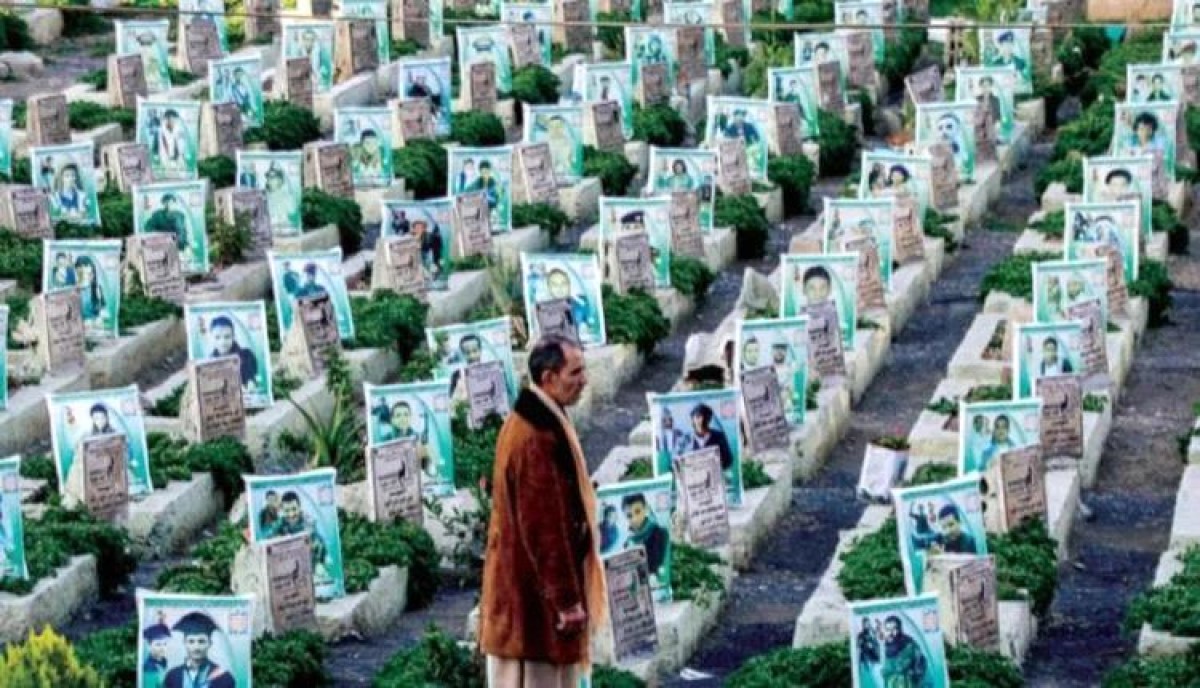Mystery surrounds the funeral of prominent Houthi leaders despite the cessation of fighting


Over the past week, the Houthi group carried out funerals for more than 15 of its dead military and security leaders without announcing the circumstances of their downfall. Despite the cessation of military battles with the Yemeni government forces on various fronts; The continuous human bleeding of its leaders and members raises questions about its causes, in conjunction with the killing of many leaders in personal disputes and attacks on the population.
A prominent leader in the group's ranks was killed, on Sunday, in Al-Jawf Governorate, northeast of the capital, Sana'a, in an ambush set up by local gunmen in retaliation for the killing of one of their relatives, days after another leader was killed in Sana'a, which is under the group's control, in a judicial dispute.
Tribal sources in Al-Jawf Governorate reported that the prominent Houthi leader, known as Abu Kamal Al-Jabali, was killed by a tribal gunman, in retaliation for the killing of one of his relatives, who was killed in a raid on a neighborhood of the Al Nouf tribe, to which the gunman belonged, carried out by the Houthi leader since months, for the purpose of forcing the people to pay royalties.
The residents of Al-Jawf accuse the dead leader of dangerous practices that resulted in the killing of a number of the governorate’s residents, travelers, and truck drivers on its desert roads, and the kidnapping and torture of many of them. They accuse him of “leading armed men affiliated with the group to carry out the work of imposing taxes on vehicles coming from the government-controlled governorates.” Its practices included kidnapping, torture, extortion, and demanding ransom from the relatives of the kidnapped people or their employers.
Sources say that Al-Jabali was considered wanted by the Yemeni government forces as a result of his practices, while several tribes were threatening to take revenge on him for the restrictions he caused on them.
At the beginning of this month, Al-Jawf Governorate witnessed the assassination of a leader in the group, nicknamed Abu Ali, along with one of his companions, in a popular market after tribal gunmen attacked him, in retaliation for one of their relatives who had been killed before that in an incident that Abu Ali is accused of being behind.
Local sources in the governorate point out that the gunmen who assassinated Abu Ali are loyal to the Houthi group, which did not take measures against them, suggesting that the assassination was part of the work of settling scores internally.
Killed inside the prison
In the capital, Sanaa, which has been controlled by the Houthi group for more than 10 years, informed local sources revealed the killing of the prominent Houthi leader, Abdullah Al-Hassani, inside one of the group’s prisons, at the hands of a resident. The gunmen who stormed the prison run by Al-Hasani after a dispute with him.
Sources indicate that Al-Hassani used his influence to release a prisoner who was being held in connection with a dispute being examined by Houthi judges, with the accused of killing Al-Hassani after an argument between them following the prisoner’s release.
Al-Hassani was assistant commander of the so-called “Central Security” of the Houthi group, which arrested his killer, and it is likely that he will be punished soon.
The group announced, last Saturday, the funeral of seven of its leaders at once, along with eight others who were funeral on separate days within a week. It said that all of them were killed during armed clashes with government forces, without indicating the places of their death, and avoided publishing pictures of the funeral activities. Collective.
The number of leaders whose funeral the Houthi group announced during this month exceeds 25 leaders, at a time when the various fronts of confrontation between it and the government forces have witnessed a continuous calm for more than two and a half years.